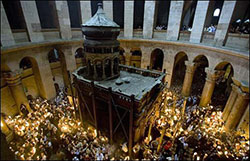 Today, Monday 18 March (Gregorian Calendar), is the beginning of Great Lent in Orthodoxy.
Today, Monday 18 March (Gregorian Calendar), is the beginning of Great Lent in Orthodoxy.
In the early church, Easter was celebrated on different days by different communities: on the day of Passover (whatever the day of the week), on the Sunday following Passover.
Inevitably Christians would come to calculate Easter without needing to be dependent on the Jewish calculation. [Not everyone agreed with separating Christian calculation from Jewish roots. Some said, “Do not do your own computations, but instead observe Passover when your brethren from the circumcision do. If they err (in the computation), it is no matter to you….”]
(As I understand it) the Council of Nicaea (325) debated the issue, but we have no computation from their deliberation. We do have the Emperor Constantine writing,
At the council we also considered the issue of our holiest day, Easter, and it was determined by common consent that everyone, everywhere should celebrate it on one and the same day. For what can be more appropriate, or what more solemn, than that this feast from which we have received the hope of immortality, should be kept by all without variation, using the same order and a clear arrangement? And in the first place, it seemed very unworthy for us to keep this most sacred feast following the custom of the Jews, a people who have soiled their hands in a most terrible outrage, and have thus polluted their souls, and are now deservedly blind. Since we have cast aside their way of calculating the date of the festival, we can ensure that future generations can celebrate this observance at the more accurate time which we have kept from the first day of the passion until the present time…
Two principles are embodied here: firstly, we should all celebrate Easter, everyone, on the same day; secondly (antisemitism acknowledged), Christians have a way of calculating this day which is not dependent on anyone outside of Christianity.
The systems that developed after that council were based on mathematical calculations, rather than astronomical observations. Differences between Rome’s and Alexandria’s calculations ceased in the sixth century when all followed Alexandria’s system.
At its simplest, Christians celebrate Easter Day on the Sunday following the full Moon which falls on or after the equinox. This is, however, not the astronomical equinox, but is just set as March 21. Nor is it an “actual” astronomical full Moon, but it is a “calculated” full Moon, the 14th day of a lunar month, determined from tables and calculations.
21 March in the Julian (Eastern) calendar, of course, falls on a different day to the Gregorian (Western) calendar. Over the centuries, the Julian lunar tables have also fallen behind the Gregorian tables.
All this means that this year, the Jewish Passover is 26 March, Western Easter Day is 31 March, and Eastern Easter Day is 5 May (= “22 April 2013” Julian).
If you appreciated this post, there are different ways to keep in touch with the community around this website: like the facebook page, follow twitter, use the RSS feed,…


